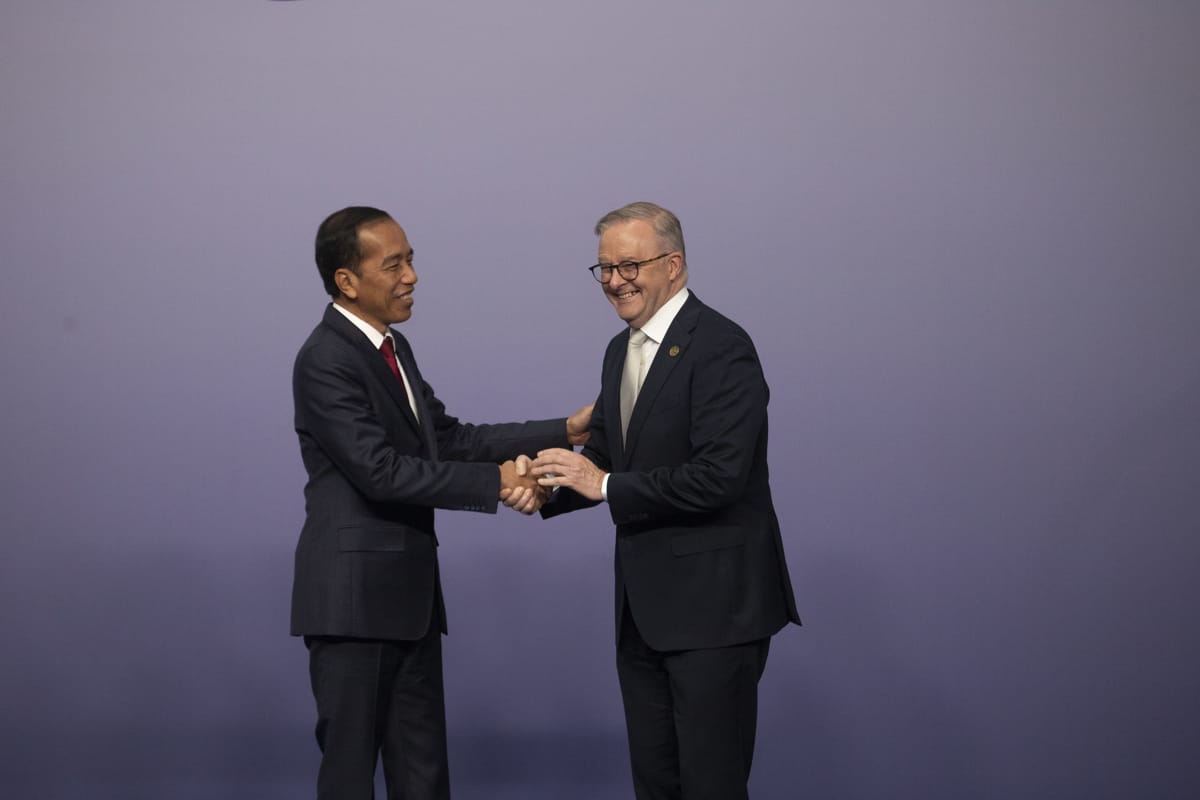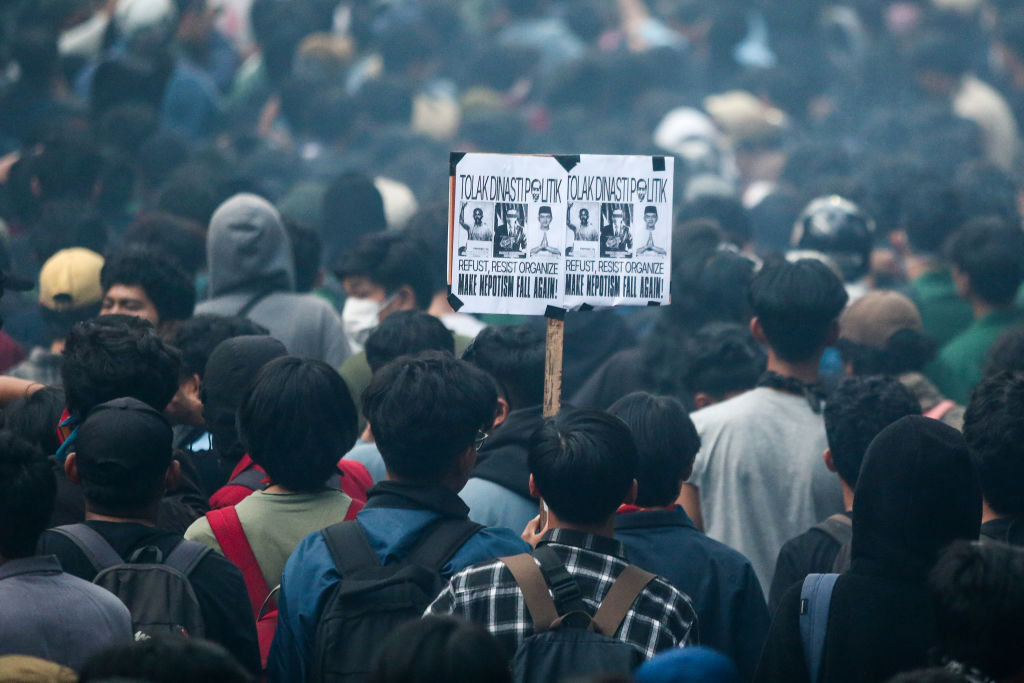Back to the future
There is a somewhat careworn characterisation of modern Indonesia as a country that keeps on changing in order to remain the same, with the rider that the more it changes the more it becomes familiar.
There will be much of this type of circular thinking in the next few months as the first president from outside the dynastic, military or religious elites, Joko Widodo, hands over after ten years in power to a scion of those elites, Prabowo Subianto.
That Widodo will preside as a sort of dynast after manipulating his son into the vice-presidency only make this sort of thinking more compelling.
After two days of watching one of the most comprehensive assessments of the Jokowi era so far at the Australian National University (ANU) Indonesia Update, repeated in part at the Lowy Institute, perhaps only two things are certain.
Jokowi won most of his infrastructure building economic credibility in his first term and leaned more towards democratic regression in his second to craft a dynasty.
Widodo was the most powerful president of the democracy era, but curiously managed less institutional change than forgotten predecessors such as B. J. Habibie. And despite an infrastructure boom, exercising this power without a solid military, party or business powerbase, overseeing a democratic decline, but running a remarkably stable economy, his real legacy may well turn out to be simply choosing the mercurial Prabowo as his successor.
Politics: changing the narrative
A quarter of a century after Habibie chaotically unleashed the latent thirst in Indonesia for a multi-party democracy built on a globally significant devolution of power, the underlying theme of many presentations at the Indonesia Update was about how and how much this has been wound back under Widodo.
And so, co-convenor Eve Warburton argues that there has been a fundamental change in the past year in the recent academically favoured narrative of democratic regression in Indonesia towards – but not yet to – competitive authoritarianism. This is manifested in the way there was virtually no manipulation of the voting or counting in the recent presidential and parliamentary elections but, nevertheless, Jokowi’s mastery of the candidate selection and campaigning process meant “uncertainty was taken out for a certain result.”

The current freewheeling democratic system was born from the joint occurrence of social unrest and economic crisis of the late 1990s. However, co-convener Sana Jaffrey speculates now that after a generation of modernisation and stability, Jokowi has straddled multifarious moves by the elites to make democracy work better for themselves.
Rather than being easily branded as greedy and venal, the elites surprisingly emerge from this re-examination with greater complexity. Indonesia managed to sustain, often under the radar, a more vibrant civil society in the Suharto years than some neighbours did. And despite the democratic regression, or worse, now under way there is a great deal of optimism that civil society remains resilient despite many pressures.
The democratic regression means “not many people talk about Indonesia as a democracy on the international stage anymore.”
However, when analysts and activists alike express this optimism, they almost inevitably concede that recent civil society protests have generally only been successful when there has been elite division and, as a result, some elite support for protests. For example, there is a general consensus that while protesters came out in force against Jokowi seeking to change the rules to help his second son into high office, it was really Prabowo being quietly opposed to this gambit that brought it unstuck.
So, the battle to ward off descent into competitive authoritarianism will depend on a combination of continued elite rivalry, civil society resilience, occasional pockets of judicial independence in an often corrupt and manipulated legal system. And, perhaps, an unexpected move to look more democratic by Prabowo to burnish his family’s three generations in Indonesian public life.
Jokowi’s success manipulating the legal system to make his elder son the vice-president superficially looks like a powerful legacy moment. But after interviewing the president over a year for a book on his administration, ANU Associate Professor Marcus Mietzner says Jokowi’s greatest legacy is his decision and ability to put Prabowo into the presidency after defeating him twice and questioning his abilities. “With this he assumes responsibility for his own decade in power and for what comes next,” he argues.

Economics: toll-roads to school lunches
Putative democrat or not, Prabowo has already shown more inclination for some economic adventurism than the newly inaugurated Jokowi did in 2014. His family’s heritage in economic policy and business means he is better informed on these issues.
And so, he has talked of Indonesia running more debt than normal to push growth towards the needed seven per cent level from the recent five per cent. And he has promised a separate tax office to deal with the country’s long history of poor tax collection mostly due to its rich families not paying their tax. And there is an expectation he will pull back somewhat from spending on the new capital city in Kalimantan, which is Jokowi’s most physical legacy.
There was a broad agreement that Jokowi did better in building new infrastructure than was expected when he came to power. But that’s where the consensus ends.
Critics say this has diminished regional autonomy, undermined social and environmental rights, and paved the way for wasteful projects like the new capital. But optimists see this as both the precedent and foundation for a new wave of economic progress if Prabowo can find and then pursue the right policy.
And so, there was a focus on whether the next president can turn his electorally populist plan for free children’s meals, in part provided by elements of the military from which he comes, into a more serious effort to improve the country’s competitiveness with a better skilled workforce.
Ironically, statesman Prabowo might have to learn that diplomatic success starts at home.
For example, Jakarta-based Australian Treasury official Cosimo Thawley says: “While Jokowi talked about how many kilometres of toll-roads he built, Prabowo is talking about how many free meals he will deliver.” And former Indonesian finance official Masyita Crystallin says: “It’s a critical juncture. We are moving from the infrastructure president to what we might call the human capital president … the devil is in the detail. But we need a new growth engine.”
There is a neat parallel between the 70 trillion rupiah a year Prabowo plans to spend on free meals to keep children healthy and attending school and the same amount Jokowi wants him to keep spending on building the new capital. And Thawley appears optimistic about Prabowo’s capacity for economic management declaring: “He certainly plans to be more daring when it comes to the economy.”
But no one thinks a human resources transformation to boost Indonesia’s productivity and growth rate can be achieved in one five-year presidential term. Jokowi won most of his infrastructure building economic credibility in his first term and leaned more towards democratic regression in his second to craft a dynasty. Prabowo already has more of a family heritage to think about.
Foreign policy: democracy vs China
Jokowi spent much of his time in office retreating from foreign policy – especially summits – in favour of transactional bilateral meetings on economic matters. It was only the pandemic, the Myanmar crisis, and then the Ukraine invasion threatening to spoil the investment promotion opportunities from Indonesian’s Group of 20 summit that brought him on to the world stage more recently.
That seems set to change from day one of the Prabowo presidency. Commentator and former ambassador Rizal Sukma predicted that Prabowo will play more of an international role than former president Susilo Bambang Yudhoyono, with the aim of being seen as the “foreign policy president” who restores the country’s global reputation as a non-aligned leader.
But that only raises a paradox. Will such a “foreign policy president” be distracted from managing the domestic challenges of democratic regression and a poorly skilled economy or will he see fixing those issues as the basis for international image repair?
Indeed, Sukma says that Jokowi’s obsessive focus on foreign policy as a tool for attracting foreign investment has bequeathed his successor with two international reputational challenges which will need to be addressed before he can hit the summit trail.
The first is that the democratic regression means “not many people talk about Indonesia as a democracy on the international stage anymore.” The second is that the Indonesian relationship with China “has really entered a new stage” due to intensified trade and investment ties, raising questions about whether the country can still play its traditional non-aligned role in Southeast Asia.
Ironically, statesman Prabowo might have to learn that diplomatic success starts at home.

